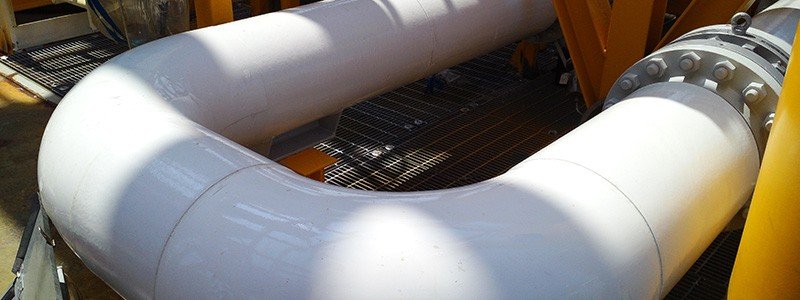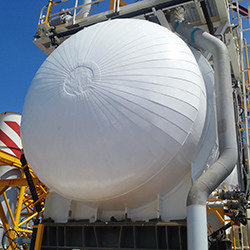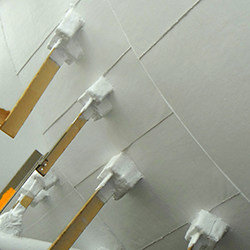Case Study - Total Dalia FPSO Refurbishment, West Africa

Total specified FibaClad & Foamglas as a result of experiencing severe corrosion under insulation (CUI) just six years after installing another non-metallic cladding system. Due to the CUI, the refurbishment project consisted of stripping the existing insulation and cladding system on fourteen vessels and the associated pipework. The FTI factory in the UK supplied the project with fittings and straights which were applied offshore in Angola.
During the inspection phase, the following failures / causes of water entry were identified:
1. Design failure
2. Insufficient temperature resistance
3. Lack of mechanical strength
4. Sealant cracking
1. The design failure of other non-metallic systems and stainless steel is the lack of ability to seal unusual terminations. Butt joints are often used and there are few solutions for very tricky, yet vital terminations. This is why, in the redesign, Total selected FibaRoll, FTI’s wet, mouldable raw material, in conjunction with FibaClad, to seal the tricky parts of the project.
2. Despite modest vessel operating temperatures the original non-metallic cladding system had deteriorated in the ambient condition offshore in West Africa. Some thermoplastics expand and contract with temperature variations and, in this case, expansion movement caused the cladding material to put pressure on the weakest part of the system, the sealant, causing severe cracking. The cladding material also failed to go back to its original shape and ‘sagged’, which FTI inspectors later found filled with water.
3. Use of the cladding as a convenient, or necessary, stepping point by contractors and operators during construction and operations means cladding often gets damaged – either itself or at the seal between joints. Conversely FibaClad has an outstanding ability to withstand mechanical damage. There have been virtually no repairs of mechanical damage in nearly twenty years of protecting insulation.
4. The resistance of sealants is critical in offshore environments with high UV levels, especially when they are applied as a beading strip. The sealant used by the other vendor had largely disappeared in six years. FTI use well-tested sealants but also apply sealants in the overlap so that the sealant has a wide footprint to seal the cladding.
FTI and Total agreed that the support of FTI’s Technical Services team would be vital to the success of the project. A dedicated FTI Technical Services Representative was appointed to work on board Dalia, alongside all parties involved, to ensure all technical queries were answered, communication was consistent between FTI, the contractor and Total, and to assist supervisors with the application on site.
Using a combination of excellent system design and performance along with pre- and in-project support from the FTI Technical Services team, FTI continues to build a strong relationship with Total and our systems have subsequently been specified for use on further Total assets including Pazflor FPSO and more recently Clov FPSO.


